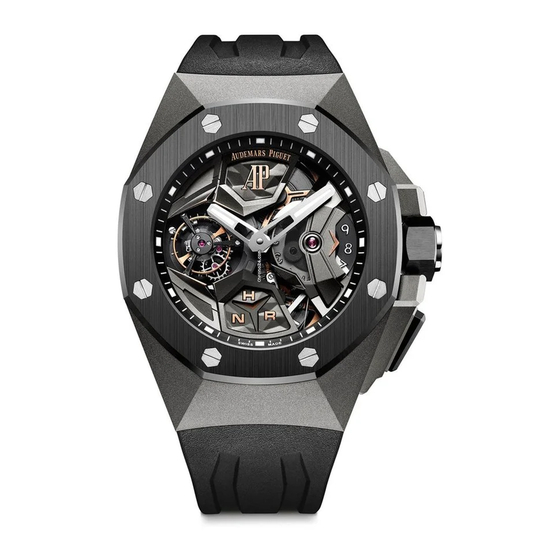
Summary of Contents for Audemars Piguet Royal Oak Concept Tourbillon Chronograph
- Page 1 INSTRUCTIONS FOR USE MODE D’EMPLOI TOURBILLON AND CHRONOGRAPH 2895 2941 CALIBRES HAND-WOUND...
- Page 3 ENGLISH...
-
Page 4: Table Of Contents
Simply click on the relevant title or subheading to following the link to your chosen section. INtrOductION p. 36 Click on the white « English » to return to the main contents - The MAnufAcTure AudeMArs PigueT page. abOut tHE watcH p. 40 - The Tourbillon... -
Page 5: Introduction
Introduction tHE MaNuFacturE audEMarS pIGuEt The vallée de Joux: cradle of The waTchmaker’s arT in the heart of the swiss Jura, around 50 kilometres north of geneva, nestles a landscape which has retained its natural charm to this day: the vallée de Joux. - Page 6 Two names for a greaT advenTure creative daring. in 1875, two young men passionate about Audemars Piguet continued to build haute horlogerie — Jules louis Audemars and edward on its now international reputation August Piguet — decided to pool their skills to design with creative designs.
-
Page 7: About The Watch
About the watch 185 years later, in 1986, Audemars Piguet successfully fitted this system for the first time into a production tHE tOurbILLON wristwatch with an ultra-thin automatic mechanical movement. The Manufacture in le brassus has since built on this success by presenting many tourbillon The mosT ouTsTanding waTchmakers have models combined with all watch complications. -
Page 8: The Chronograph
A watchmaker from the vallée de Joux - Adolphe nicole - invented the modern chronograph, lodging the first patent for this complication in 1844. since its founding in 1875, Audemars Piguet has been developing and making some of the most sophisticated and efficient chronographs in the world. -
Page 9: Twin-Barrel System - Power Reserve
237 hours (about ten days). This endurance is cone transmission was developed by Audemars achieved by a large-diameter, twin-barrel system Piguet. developed by Audemars Piguet, with a stopwork mechanism guaranteeing optimum performances. The Manufacture has now adapted this system to a wristwatch format, enabling extremely accurate energy aT iTs besT adjustment of the amplitude of the indicator hand. -
Page 10: The Materials
Pvd coating. research work in another field led to the development of innovative ceramics. for the crown and pushpieces, depending on the model, Audemars Piguet selected a ceramic material with very specific physical properties. The ceramic has undergone particularly delicate treatments calling on all the knowhow of the Manufacture’s engineers and watchmakers. - Page 11 TreaTmenTs and finishes of course, other materials are also used to make the various parts that comprise the movement. yet what makes this watch truly outstanding are the different treatments applied to these visible parts: some are hand-drawn and polished, others are anodised (an oxidation process to colour and protect aluminium), sapphire-blasted (sandblasted, matt surface) or coated with black Pvd to increase...
-
Page 12: Watch Description
Watch description Technical daTa of The movemenT vIEwS OF tHE MOvEMENt Total thickness: 10.67 mm Total diameter: 34.60 mm calibre 2895 frequency of balance wheel: 3 hz (21,600 vibrations/hour) number of jewels: 34 Minimal power reserve: 237 hours hand-wound balance with variable inertia screws breguet balance-spring Mobile stud-holder number of parts: 392... - Page 13 Watch description Technical daTa of The movemenT vIEwS OF tHE MOvEMENt Total thickness: 10.67 mm Total diameter: 34.60 mm calibre 2941 frequency of balance wheel: 3 hz (21,600 vibrations/hour) number of jewels: 34 Minimal power reserve: 237 hours hand-wound balance with variable inertia screws breguet balance-spring Mobile stud-holder number of parts: 393...
-
Page 14: Use Of Functions
Use of functions watcH INdIcatIONS aNd FuNctIONS (see figure on the inside cover) hour hand Minute hand second counter hand linear minute counter hand (up to 30 minutes) Power reserve indicator hand crown position indicator hand Pushpiece of the chronograph function Push once: start Push again: stop Pushpiece to return to zero... -
Page 15: Crown Position Indicator
Use of functions seTTing The Time Always unscrew the crown to access the different crown posiTion indicaTor setting positions. your watch features a hand indicating the position Pull the crown to position H. you may now set the of the crown. time by winding in either direction without risk of damaging the movement. -
Page 16: Using The Chronograph
Use of functions returning to zero Press the pushpiece using The chronograph start Press the pushpiece stop Press pushpiece once again To read the time taken for an event, consult the following: – the chronograph hand – the minute counter hand continue the timing After the first stop, the chronograph can be restarted and stopped at will without first requiring you to... -
Page 17: The Linear Minute Counter
Use of functions power reserve power reserve – “full” The linear minuTe counTer Approximate position of how do you read the linear minute counter? the hand after the watch has been completely This minute counter consists of a dedicated indicator rewound, with a power hand mounted on the counter spindle.

















Need help?
Do you have a question about the Royal Oak Concept Tourbillon Chronograph and is the answer not in the manual?
Questions and answers